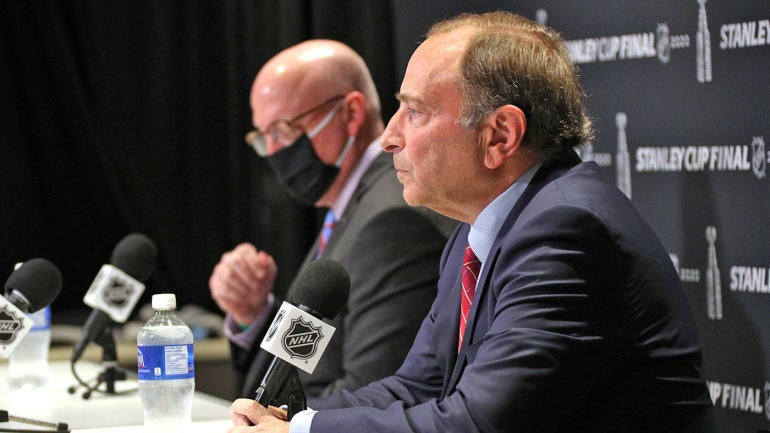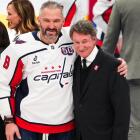
The last time the NHL was in action, the league was earning praise for its ability to smoothly navigate the coronavirus pandemic. It successfully completed the Stanley Cup Playoffs inside two hub cities -- Edmonton and Toronto -- while administering over 33,000 COVID-19 tests without a single positive case.
Now, a little over two months since the Cup was handed to the Tampa Bay Lightning, the NHL has largely been stuck in a state of radio silence. After the 2019-20 season concluded, the expectation was that there would be a quick turnaround and the league would jump into a new season in late December or early January. That timeline has been pushed back to at least the middle of January, according to a recent report from ESPN.
Scheduling-wise, the NHL typically operates in near-lockstep with the NBA. But, as NBA training camps are already underway and the league is set to kick off its 2020-21 season in just a few weeks, the NHL is still stuck trying to navigate through negotiations setting up an unprecedented season. The league and NHLPA have been at an impasse for much of this strange offseason.
While the latest mid-January timeline is good news for those hoping to see hockey during these winter months, there remain a number of hurdles that the NHL and NHLPA will have to clear (and quickly) in order to cross the finish line in setting up a new season.
Scheduling crunch
Chances of a full 82-game season are all but dead at this point, and if the NHL hopes to play a sizable schedule (50-60 games) then they're running out of time. NHL commissioner Gary Bettman has already said that he doesn't want the playoffs to carry well into the summer like they did in 2020. With the NHL playoffs and Olympics both being handled by NBC networks, it's likely that the league is looking at early-mid July (the Olympics are scheduled to begin on July 23) as its targeted end date for the 2021 playoffs.
Given the need for a multi-week training camp period and likely a short preseason, the NHL is likely looking at a minimum 3-4 week prep window after a deal is agreed to, meaning a mid-January start should be considered very optimistic at this point.
When the league played a lockout-shortened campaign in 2013, the season began on January 19 and saw a 48-game season played ahead of the playoffs, which wrapped up in late June. With that timeline in mind, if the league doesn't agree to a deal over the next few weeks, they'll likely have to start cutting the number of games they hope to play and/or get very creative with the scheduling in order to come up with a viable and respectable season. This could be further complicated by a projected spike in COVID-19 cases over the holiday season.
Keep in mind that the league will also likely want to have a built-in grace period in between the regular season and playoffs in order to allow teams to make up any postponed games throughout the season.
CBA disagreements
Stop me if you've heard this one before: the biggest thing preventing the NHL from getting back to playing right now is a holdup with the league's collective bargaining agreement. After two lengthy lockouts in the past 16 years, it looked like we were going to avoid another CBA saga when the NHL and NHLPA agreed to a deal back in July.
However, much like the situation that we saw play out with MLB and the MLBPA earlier in 2020, the NHL has gone back on its original deal and is asking the Players' Association for more concessions given the state of the pandemic and the financial projections for the upcoming season.
Here are some details on the CBA situation, courtesy of Forbes:
"The NHL is asking the NHLPA to agree to one of two proposals. The first proposal would see the portion of salaries placed in escrow increase to 25% for the 2020-21 season while players deferred 20% of their salaries. Alternatively, the league is asking the players to defer 26% of their salaries next season while the escrow figure stays flat at 20%. In the current deal, the players agreed to a 20% escrow figure and a 10% deferral of salary."
As you'd imagine, players aren't thrilled with the idea of giving up more money, especially with a shrinking number of game checks (potentially) coming their way. Given that there's already been an initial agreement and there's no full-blown lockout or strike on the table, it's not the same level of disagreement that we've seen plague the NHL's operations over the past few decades. But the two sides already shared a relatively contentious relationship before attempting to hash out concessions in an unprecedented situation, so it's not entirely surprising that there have been some bumps in the road.
At this point, the two sides are still attempting to reach a (new) agreement, and if they're able to do that then the details of a shortened season will likely be hammered out in short order. However, there remains the possibility that the league could use the pandemic to invoke a force majeure -- unforeseeable circumstances that prevent a contract from being fulfilled -- and cancel the season.
It's been suggested by some that league owners might stand to lose significantly more money if a season is played rather than cancelled.
Realignment and border complications
With the pandemic surging once again, the NHL will have to navigate various protocols and mandates as it attempts to create a new season schedule. As we've seen with other leagues, such as MLB and the NBA, a closed border between the United States and Canada presents some challenging obstacles. The Blue Jays moved to Buffalo while the Raptors will play this season in Tampa. Because there are so many teams in Canada, the NHL's task is far more complicated than forcing one team to change home cities for a season.
The league was able to avoid cross-border headaches last season thanks to its two hub cities being located in Canada (which was rightly viewed as the safest option to host the playoffs) but it's highly unlikely that the league will pursue a similar bubble-type solution for the upcoming season. Two NHL players who participated in the NHL's playoff bubble told CBS Sports that there is little interest in another bubble. One player described the experience as "miserable" and the other said they'd prefer the season be canceled over participating in a bubble.
NHLPA executive director Don Fehr said in September that "nobody is going to do that for four months or six months or something like that," regarding bubbles.
So instead, it's more likely that the NHL would seek a temporary league realignment to create a division comprised of all Canadian teams. The remaining 24 U.S.-based teams would likely be grouped into three divisions based on closest geographical proximity in an effort to limit travel miles.
But even a league realignment may not save the NHL from future headaches. As we've seen in California's Santa Clara County, local health and government regulations can dictate whether sporting events are played in individual cities. Santa Clara recently suspended all sporting events for three weeks as a measure to curb coronavirus outbreaks, and that forced the San Jose Sharks to shut down their facilities. In the NFL, it has forced the San Francisco 49ers to temporarily host games in Arizona. If other cities were to follow suit in the coming weeks and months, that could throw a wrench in an already difficult scheduling process.
![[object Object] Logo](https://sportshub.cbsistatic.com/i/2020/04/22/e9ceb731-8b3f-4c60-98fe-090ab66a2997/screen-shot-2020-04-22-at-11-04-56-am.png)


















